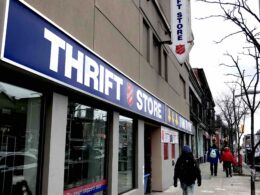The high price of food has a lot of people upset. Frustrated shoppers have organized a boycott against Loblaws. The federal government is pleading with Loblaws and Canada’s food giants to be nice. But there are some people who are already part of a food alternative. Abhishek Chari lives in the Oakwood Village area and is a member and co-owner of Karma Co-op, an alternative grocery store in the Annex neighbourhood.
Karma Co-op is a non-profit grocery store that’s been around since 1972. Abhishek says there’s been a lot more interest lately in the co-op model of groceries because of the high prices of food. People are also tired of such a basic necessity like their food being out of their control.
“The situation in which co-ops like Karma started and the situation right now are very similar,” says Abhishek. “What we want to do is tell people how we managed to keep the co-op going for 50 years,” says Abhishek.
Abhishek explained that co-ops specialize in getting food under community control. For example, Karma Co-op is owned by community members. Each member has a say and a vote in every aspect of the shop. Everyone knows where the shop’s food is coming from, how it’s grown and even who grows it.
Food prices are transparent, with members and store staff often collaborating on price comparisons. Abhishek says the co-op’s prices are competitive with local competitors like Farm Boy and Fiesta Farms.
Karma Co-op keeps its costs low. They are non-profit so they’re not raising food prices for the market and share prices. They cut out some of the costs of the middleman by buying directly from many small scale local farmers and producers. Members of Karma Co-op own the historic building where it’s located so they can’t be kicked out by landlords looking to double rents. Members can also volunteer their time to get work done at the shop.
That’s why Karma Co-op has been like a rock in the stormy seas of the retail food industry. Other small shops have come and gone but Karma is still there. Right now, Karma has about 500 member households.
It’s not to say Karma Co-op has always had an easy time. The pandemic hurt Karma like it hurt every other small business. “Membership took a huge hit. We struggled to make ends meet. Now we’re climbing out of that hole, membership is rising, more people want to come back into the store. We’re doing campaigns to attract more members. And now more people are interested,” says Abhishek.
Given Karma’s long-lasting success, it’s no wonder more people are interested in the shop’s model of local control of food. It’s a model that can be emulated in any community in the city. After all, Karma Co-op was started by a small group of about 10 people who worked together and pooled their own money to start.
Like the American cultural anthropologist Margaret Mead said, “Never doubt that a small group of thoughtful, committed, citizens can change the world. Indeed, it is the only thing that ever has.”






